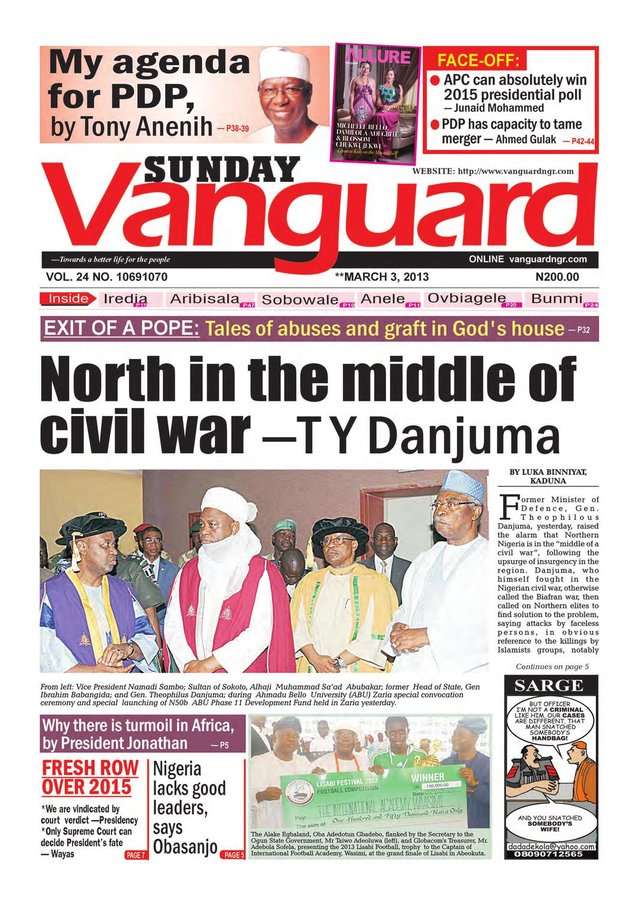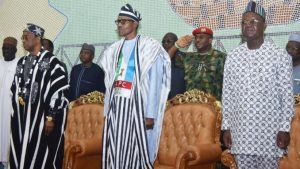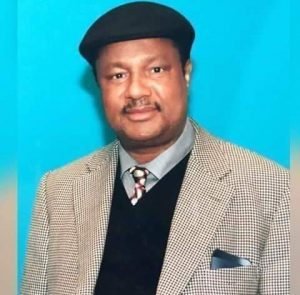Mapping the Changing Phases, Phrases and Fortunes of the Northern Elite Up to the Era of Banditry (3)

In his May 7th, 2019 lecture at the University of Nigeria, Nsukka, Governor Samuel Ortom of Benue State reiterated his conviction that “The concern of Benue people is not just with the herdsmen militia, be they Libyans, Boko Haram, ISIS or any other mercenary terrorist force. Our concern is with those who hire the killers as mercenaries; those who bring them and show them our ancestral lands for them to turn into killing fields”. He named the president, the Minister of Defence, the Chief of Army Staff, the then Inspector-General of Police, the Miyetti Allah Kautal Hore and Miyetti Allah Cattle Breeders Association of Nigeria to be in one camp, united in arguing that Benue State’s anti-grazing law is the trigger for the killings in the State.

President Buhari and Gov Ortom of Benue State
Although, names such as Senator George Akume, Rotimi Amaechi and Adams Oshiomhole appeared along President Buhari, the Minister of Defence, the Chief of Army Staff, the then Inspector-General of Police, the Miyetti Allah Kautal Hore and Miyetti Allah Cattle Breeders Association of Nigeria on Governor Ortom’s list, it is not difficult to infer that he is talking about a cabal or an oligarchy that must be of Hausa-Fulani cultural identity as the organisers of the violent attacks. Of course, it would be stupid to say that a caucus of elite Fulani identity does not exist and does not have its aspirations and design on Nigeria. That is not possible since almost every other ethnic group or collections of them have the same aspirations and design on Nigeria. What is problematic is the association of this perceived cabal with willful use of violence as an instrument of power. That is where the problem is.
It is not problem in the sense of whether the claims and counter-claims on both sides are true or untrue. It is a problem in the sense that the enemy images have the power to produce the reality they name - the reality of war. As British economist, John Maynard Keynes would say, the world is ruled by little else than ideas and the images they transmit. Embodied in this frame game by the different framers of herdsmen violence is thus the danger of producing the reality of an all-conquering protagonists or conquered antagonists of the violence in question, the accomplishment of either of which will come with horrendous costs. Some people would say that is already happening with collapse of the rural economy now regularly mentioned. So also is a Nigerian equivalent of the Janjaweed in Sudan which signifies aggravated rural banditry, genocide in short. What is the guarantee that there would not be a reverse Janjaweed?
Yet, no mechanism exists to have managed this intra-elite breakdown over ‘herdsmen’ violence on farmers. Peace makers might have been at work behind the scenes but the kind of open activities that should have a calming effect on the larger populace are not happening. Ordinarily, a president of Northern origin should have been the chief peace practitioner in such a circumstance. However, Gov. Ortom’s list of adversaries of the anti-Open Grazing law in his state has the president as number one on the list of its antagonists. To make matters worse, there is a northernisation of the insecurity crisis in the region by those heavily invoking an already badly fragmented Northern elite instead of reading the insecurity as a national threat to Nigeria. It is still not helpful if the phrase Northern elite is intended as a shorthand for the Hausa-Fulani elite berated for transforming power into mass poverty because the kind of altercation between Abuja and Makurdi, for example, or the on-going banditry shows a society already imploding as a consequence of the long hold on power assessed to be unproductive. It is, therefore, cyclical reasoning to go back to the long rein in looking for answers to flashes which it has triggered in the first case.

The late Alhaji Muhammadu Abubakar Rimi, Kano State governor, 1979 - 1983 and the doyin of the Progressive Governors Meeting of those days
Elite fragmentation anywhere else is almost always a trigger of crisis. The tone of the cultural, political and religious conversation in the North needs to change. That change would have been very achievable if, for instance, there are even just two among the in-coming governors similar to Kano and Kaduna states in 1979 with hope restoring, progressive policies that can change the issue from fractional in-fighting to the question of options in social transformation. The PRP did this by abolishing Jangali and Haraji taxes in Kano and Kaduna states where they were in power in 1979, showing the North and, in fact, the entire country the developmental way forward, especially about an over-burdened peasantry across Nigeria. The fact that nobody has ever suggested re-introduction of the abolished taxes, 40 years after that epochal utilization of power for the people shows its progressiveness. That is besides the agricultural roadmap of the then Kaduna State Government, for instance. The North would recover instantly with such approach to leadership, power and governance.
That is the North that one can still talk about in a world of criss-crossing, interpenetrating, uniting and dividing mixture appropriately called ‘space of flows’. It is not clear if anything of that nature is coming. There is nothing close to a PRP of 1979 anymore and there is no segment of any of the existing parties sharing any sense of history similar to the PRP of 1979. Although, for rushing to retool himself quickly at Harvard University, the Lagos State governor-elect sends a cheering signal to Nigeria at a time most political office holders are overwhelmed by the offices they hold, it doesn’t seem anything close to 1979 is in the making. Meanwhile, the PRP that exists hasn’t captured power yet. The current ding-dong is then likely to continue because it is doubtful if the various fractions and factions of the Northern elite can overcome the tension among them and get itself together immediately as they (and their Southern counterparts) should in a world of intensifying ‘spatial fix’ and deterritorialised threats. That makes it unimaginable how any other alternative to fortifying the Nigerian State as the only viable shield against a ‘world risk’ society would work. It is frightening that ‘world risk society’ fears do not even feature in the options being canvassed in terms of responses to the current intra-elite tension, both in the North and in Nigeria.
Every conflict can go out of hand just as every conflict can be managed. The dividing line is the presence or absence of a moderating influence on protagonists and antagonists. The danger here is that we are all protagonists and antagonists. There is basis for fear!
Posted from my blog with SteemPress : https://intervention.ng/16057/